Democrats’ Divide on Voting Rights Widens as Biden Faces Pressure
The president is increasingly at odds with leaders of the voting rights movement, who see a contrast between his soaring language and his willingness to push Congress to pass federal legislation.
WASHINGTON — A quiet divide between President Biden and the leaders of the voting rights movement burst into the open on Thursday, as 150 organizations urged him to use his political mettle to push for two expansive federal voting rights bills that would combat a Republican wave of balloting restrictions.
In the letter, signed by civil rights groups including the Leadership Conference and the National Association for the Advancement of Colored People, activists argued that with the “ideal of bipartisan cooperation on voting rights” nowhere to be found in a sharply divided Senate, Mr. Biden must “support the passage of these bills by whatever means necessary.”
The issue is of paramount importance to Democrats: Republicans have passed roughly 30 laws in states across the country this year that are likely to make voting harder, especially in Black and Latino communities, which lean Democratic. Several of the laws give state legislators more power over how elections are run and make it easier to challenge the results.
In a fiery speech in Philadelphia last week, Mr. Biden warned that the G.O.P. effort was the “most significant test of our democracy since the Civil War.”
negotiating on the particulars of voting rights legislation, has faced calls to push Democratic senators to eliminate the filibuster, which would allow the two major voting bills proposed by the party to pass with a simple majority. The president and his advisers have repeatedly pointed out that he does not have the votes within his own party to pass federal voting legislation, and does not have the power to unilaterally roll back the filibuster even if he supported doing so.
But voting rights groups say that Mr. Biden is not expending sufficient political capital or using the full force of his bully pulpit to persuade Congress. They point to the contrast between his soaring language — “Jim Crow on steroids,” he has called the G.O.P. voting laws — and his opposition to abolishing the Senate filibuster.
“As you noted in your speech, our democracy is in peril,” the groups said in their letter. “We certainly cannot allow an arcane Senate procedural rule to derail efforts that a majority of Americans support.”
Ultimately, the advocates fear that the Biden administration — currently focused on a bipartisan infrastructure deal and an ambitious spending proposal — has largely accepted the Republican restrictions as baked in, and is now dedicating more of its effort to juicing Democratic turnout.
more of a political statement than viable legislation when it was first introduced in 2019, and the John Lewis Voting Rights Advancement Act, which would restore important parts of the Voting Rights Act that the Supreme Court stripped away in 2013.
Republicans have castigated the For the People Act as overreaching and partisan. And Senator Mitch McConnell of Kentucky, the minority leader, has said there is no need for a bill restoring parts of the Voting Rights Act.
White House officials privately note that even if Mr. Biden came out in support of ending the filibuster, moderate Democrats, including Senator Joe Manchin III of West Virginia and Senator Kyrsten Sinema of Arizona, have publicly resisted such a move. Mr. Manchin has also called the For the People Act a piece of “partisan” legislation.
When asked whether the administration’s focus had shifted toward political organizing and opposing the G.O.P. laws in the courts, the officials say that critics who are focused on federal voting protections are misinterpreting the president’s public remarks.
Cedric Richmond, a senior adviser to Mr. Biden and a former congressman from Louisiana, said in an interview that advocates who have zeroed in on Mr. Biden’s comments about organizing should see them as one part of the administration’s broader work on voting rights.
“I think it’s very clear what he said,” Mr. Richmond said of the president’s speech in Philadelphia. “Which is: We’re going to have to meet this challenge in the courts, in the halls of Congress and in the streets.”
But in interviews, more than 20 civil rights leaders and voting rights advocates said that while they believed in Mr. Biden’s conviction to protect the right to vote, they thought his call for a “new coalition” of Americans to take up the issue was not what they needed from the White House.
Some advocates found this approach — the idea that the vaunted voter registration, education and get-out-the-vote efforts that helped propel Mr. Biden to victory could be used against G.O.P. voting laws — naïve at best, signaling that the White House viewed the issue as simply an election challenge, rather than a moral threat to broad civil rights progress.
“The notion that some new coalition can be formed that would allow for greater efforts at organizing and voter turnout is perhaps a bit unrealistic,” said Wade Henderson, the president of the Leadership Conference on Civil and Human Rights. “We have already formed one of the most diverse and strongest coalitions in support of voting rights that ever existed. At the end of the day, that is inadequate to the challenge of the moment. We need federal legislation.”
Voting rights advocates have taken note of the fact that Mr. Biden, who has publicly negotiated with holdout senators from both parties for his stimulus and infrastructure proposals, has yet to openly exert similar pressure on senators when it comes to voting rights.
said during a speech in Tulsa, Okla., last month. “Well, because Biden only has a majority of, effectively, four votes in the House and a tie in the Senate, with two members of the Senate who vote more with my Republican friends.”
Mr. Biden’s aides say the way forward must be based partly on education, because the new Republican laws will add complications to voting like making it harder to cast a ballot early or by mail, limiting drop boxes and shortening early voting periods.
The president signed an executive order this year directing all federal agencies to find ways to make it as easy as possible to register Americans to vote. In a speech this month, Vice President Kamala Harris said the Democratic National Committee would dedicate $25 million to an effort to educate voters.
Inside the White House, officials say they are hard at work bringing together voting rights advocates, poll workers and others who can tell them more about problems on the ground. Dozens of advisers hold several meetings a day on the subject. The president requests updates on the issue daily, according to three advisers familiar with his schedule.
Progressive groups and advocates say the White House should have a larger role to play.
“Talking about grass-roots organizing, talking about voter registration is important, and we are grateful for the amplification of what our work is — and I want to be clear that that’s our work,” said Nsé Ufot, the executive director of the New Georgia Project, a civil rights group. “That’s what we’ve been doing. That’s what got us to this moment. That’s what gave us a Biden-Harris administration. And now we need them to do their jobs. I can’t write legislation. I can’t whip votes. I don’t have 47 years in that body, in the United States Senate. I’m not the president of that body. But they are.”
The Rev. Dr. William J. Barber II, the founder of the Poor People’s Campaign and a prominent civil rights leader, urged Mr. Biden to wield his influence. “Go to Texas, and meet with a diverse group of people on the ground to put a face on this issue. Then go to Arizona. Go to West Virginia,” he said. “There ought to be a speech from the well of Congress.”
Democrats have been blanketing the airwaves, outspending Republicans on ads related to voting by $9.2 million to $1.6 million across the country, though the bulk of the money has come from left-leaning outside groups like End Citizens United, Fair Fight Action and Fix Our Senate.
“We need more from the president,” said Beto O’Rourke, the former Texas congressman and Democratic presidential candidate. “It’s only through his leadership, frankly, that we have any hope of passing voting rights legislation before it’s too late.”
You are using an out of date browser. It may not display this or other websites correctly.
You should upgrade or use an alternative browser.
You should upgrade or use an alternative browser.
How will Joe Biden GOVERN? General Biden Administration F**kery Thread
- Thread starter FAH1223
- Start date
More options
Who Replied?Smoking With Cigarettes
Superstar
So let black and brown people be once again saddled with the burden of beating these evil white MFs while the elites we elect promise to fight for us but only at their convenience

If they think they're mobilizing people while they already have power and without the looming threat of Trump, then the Dems are clowning
Medicare 4 All March tomorrow. See you there.
Protestors in Several Dozen Cities to March for Medicare for All this Saturday

AnonymityX1000
Veteran
Just answering the query in the tweet you posted.
Not familiar with her as I'm in NYC. But thanks for sharing.
mastermind
Rest In Power Kobe
Piff Perkins
Veteran
Stop posting that nonsense, Jesus Christ. Embarrassing over reaction.
Worthless Loser
Blackpilled
nah. we need it. black people need to start calling these people out.Stop posting that nonsense, Jesus Christ. Embarrassing over reaction.
AnonymityX1000
Veteran
Hmmm . . . Black people need to call it out. You are calling it out and claim to be Black so what's needed? Unless . . .nah. we need it. black people need to start calling these people out.
AquaCityBoy
Veteran
Stop posting that nonsense, Jesus Christ. Embarrassing over reaction.
The only thing that's embarrassing here is Biden and the Democrat's absolute failure to meet the moment on voting rights.

Obviously we need to the federal government to step up but at the state/local level are blue states making improvements regarding voting?
Hmmm . . . Black people need to call it out. You are calling it out and claim to be Black so what's needed? Unless . . .
Stop posting that nonsense, Jesus Christ. Embarrassing over reaction.
OUT ORANGIZE
These clueless idiots.



Wide partisan divide on whether voting is a fundamental right or a privilege with responsibilities
July 22, 2021
Wide partisan divide on whether voting is a fundamental right or a privilege with responsibilities
By Vianney Gomez and Carroll Doherty
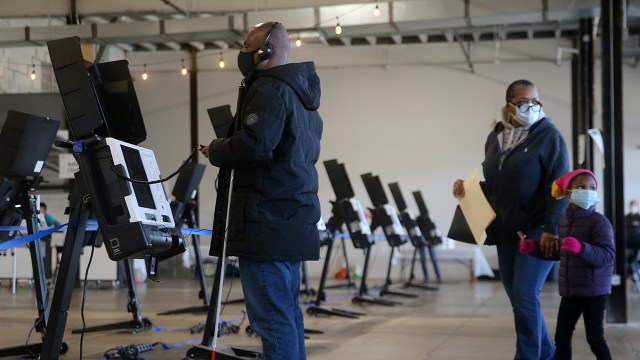
A voter casts a ballot on Nov. 3, 2020, in Washington, D.C. (Yegor Aleyev/TASS via Getty Images)
As political battles continue around the nation over voting access and restrictions, a new Pew Research Center survey finds that a majority of Americans (57%) say voting is “a fundamental right for every adult U.S. citizen and should not be restricted in any way.”
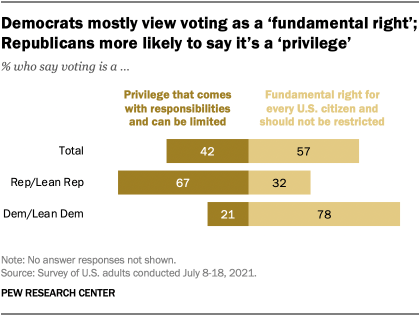
Fewer (42%) express the view that “voting is a privilege that comes with responsibilities and can be limited if adult U.S. citizens don’t meet some requirements.”
Democrats and Democratic-leaning independents overwhelmingly say voting is a fundamental right that should not be restricted in any way – 78% hold this view, while fewer than a quarter (21%) say it is a privilege. Two-thirds of Republicans and Republican leaners say voting is a privilege that can be limited
 if requirements are not met, compared with about half as many (32%) who say it is a fundamental right.
if requirements are not met, compared with about half as many (32%) who say it is a fundamental right.How we did this
The survey, conducted July 8-18, 2021, also finds a rare point of partisan agreement when it comes to the importance of all qualified citizens being allowed to vote. However, there are sizable differences in confidence about whether this is happening – and even wider differences in confidence in whether people not legally qualified to vote are prevented from voting.
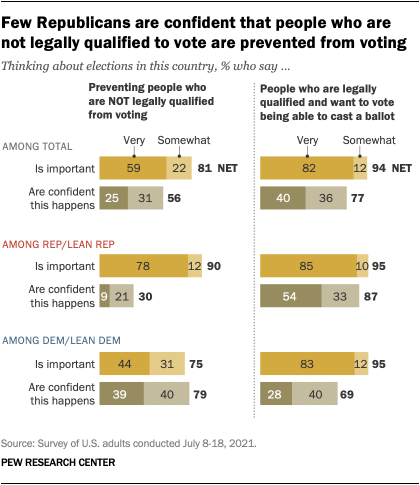
Nearly all Americans (94%) – including 95% of both Republicans and Democrats – say it is important that people who are legally qualified to vote are able to cast a ballot, with 82% saying it is very important.
A large majority of Republicans (87%) are at least somewhat confident that legally qualified people are able to vote if they want to, including 54% who are very confident this is the case. Democrats express less confidence: 69% say they are at least somewhat confident that legally qualified people are able to cast a ballot, and just 28% say they are very confident in this.
Most Americans (81%) also say it is at least somewhat important to prevent people who are not legally qualified to vote from doing so. While large majorities in both parties say this is at least somewhat important, Republicans are considerably more likely than Democrats to say it is very important to prevent this (78% vs. 44%). In contrast, Democrats are much more confident than Republicans that this happens: 79% say they are either very or somewhat confident it does, compared with just 30% of Republicans.
In a survey conducted last October, Democrats and Republicans were similarly divided over whether people who were not legally qualified to vote would be prevented from casting ballots in the then-upcoming 2020 presidential election.
Demographic differences in views of voting as a right or a privilege
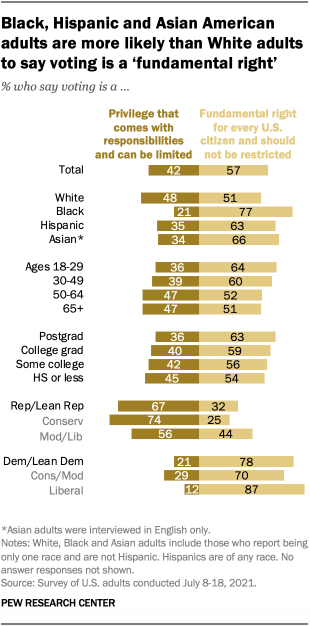
Black Americans are more likely than those in other racial and ethnic groups to see voting as a fundamental right, while White Americans are the least likely to say this.
 About three-quarters of Black Americans (77%) say voting is a right for every U.S. citizen and should not be restricted, as do 63% of Hispanic Americans and 66% of Asian Americans. White Americans are about evenly divided: 51% say voting is a right, while 48% say it is a privilege.
About three-quarters of Black Americans (77%) say voting is a right for every U.S. citizen and should not be restricted, as do 63% of Hispanic Americans and 66% of Asian Americans. White Americans are about evenly divided: 51% say voting is a right, while 48% say it is a privilege.Younger adults are more likely than older adults to say that voting is a fundamental right for U.S. adult citizens: 62% of Americans ages 18 to 49 say that voting is a fundamental right, while 52% of Americans 50 and older say this.
Those with higher levels of education are somewhat more likely than those with less education to take the view that voting is a right rather than a privilege.
While ideological divides within the two partisan groups are far more modest than the overall partisan differences, conservative Republicans are more likely than moderate and liberal Republicans to say that voting is a privilege that can be limited (74% vs. 56%). At the same time, liberal Democrats are more likely than conservative and moderate Democrats to say that voting is a fundamental right that should not be restricted (87% vs. 70%).
Within partisan groups, views about whether voting is a fundamental right vary with age, race and ethnicity, and education.
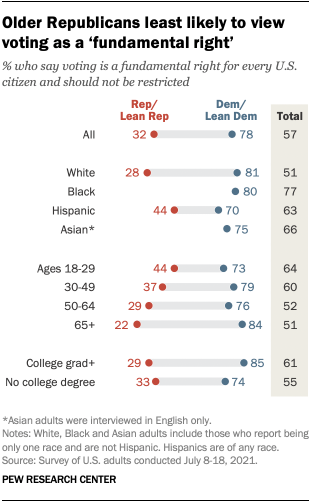
Although majorities of Republicans – across age groups – view voting as a privilege with responsibilities that can be limited, younger Republicans and GOP leaners are more likely than older Republicans to say that voting is a fundamental right for every U.S. adult citizen: 44% of Republicans and Republican leaners under 30 say it is a fundamental right, compared with 37% of those ages 30 to 49, 29% of those 50 to 64 and just 22% of those 65 and older.
By contrast, there are more modest age differences in these views among Democrats, with seven-in-ten or more across all age groups viewing voting as a fundamental right. However, Democrats ages 65 and older are somewhat more likely to say this than younger Democrats.
About eight-in-ten White (81%) and Black (80%) Democrats say that voting is a fundamental right, as do 75% of Asian American Democrats and 70% of Hispanic Democrats.
 Among Republicans, Hispanic Republicans are more likely than White Republicans (44% vs. 28%) to view voting as a fundamental right.
Among Republicans, Hispanic Republicans are more likely than White Republicans (44% vs. 28%) to view voting as a fundamental right.

Among Democrats, those who have obtained a college degree (85%) are somewhat more likely than those who have not (74%) to view voting as a fundamental right. The reverse is true among Republicans: Those with a bachelor’s degree or more education are slightly less likely than Republicans without a college degree to say voting is a fundamental right (29% vs. 33%).

and no one ever holds the people accountable. It’s always the fault of the media, the politicians or other entities.
The truth is we are a shyt people and we deserve everything we get and have coming.

fukkin Biden


